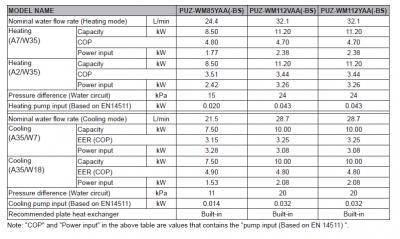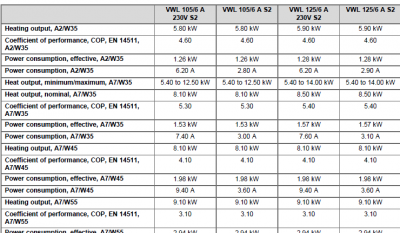Navigating the World of Refrigerants In Heat Pumps: A Guide for Homeowners
In the United Kingdom, where environmental consciousness and energy efficiency are increasingly prioritised, understanding the role of refrigerants in heat pumps is important for homeowners. The type of refrigerant used in a heat pump not only impacts its efficiency but also its long-term environmental footprint. Among the commonly used refrigerants, R32, R290 (propane) and R410a stand out, each with unique characteristics and implications for homeowners.
R32: The Efficient Choice
R32 refrigerant has gained popularity in recent years, primarily due to its efficiency. It is approximately 20% more efficient than both R290 and R410a. This efficiency translates into better performance of the heat pump, leading to more effective heating of homes while using less energy. For environmentally conscious homeowners in the UK, this means lower electricity bills and a reduced carbon footprint.
However, the efficiency of R32 comes with a trade-off. The refrigerant's Global Warming Potential (GWP) is 675, which is considerably higher than that of R290. GWP is a measure of how much heat a greenhouse gas traps in the atmosphere compared to carbon dioxide. The higher the GWP, the more a particular gas contributes to global warming.
Despite its higher Global Warming Potential (GWP), R32 demonstrates a lower lifetime GWP compared to R290, particularly when considering its potential release into the atmosphere. In the context of heat pump usage, the high efficiency of R32 leads to considerable CO2 savings, estimated at around 3 tonnes annually for an 8 kW heat pump. This efficiency makes R32 a compelling option for UK homeowners who aim to balance operational efficiency with environmental considerations. However, this balance is contingent on the safe extraction and management of the refrigerant at the end of the heat pump's lifespan, ensuring that it is not inadvertently released into the atmosphere.
R290: Environmentally Friendly but Less Efficient
R290, or propane, is another refrigerant used in heat pumps. Its most notable feature is its exceptionally low GWP of 3, making it one of the most environmentally-friendly refrigerants available.
However, R290 is less efficient than R32. This lower efficiency means that heat pumps using R290 will consume more energy to provide the same level of heating or cooling as those using R32. Over time, this increased energy consumption could negate the environmental benefits offered by its low GWP, especially considering the CO2 emissions associated with energy production.
R410a: A Common but Phasing-Out Option
R410a has been a common refrigerant in heat pumps for several years. It offers reasonable efficiency and performance. However, with a GWP of 2088, it has a significantly higher environmental impact compared to R32 and R290 if released into the atmosphere. Given the UK's commitment to reducing greenhouse gas emissions, the use of R410a is increasingly being scrutinised, and it is gradually being phased out in favour of more environmentally friendly options.
What UK Homeowners Should Consider
When choosing a heat pump, UK homeowners need to consider both the efficiency of the unit and the environmental impact of the refrigerant used. It's important to note that refrigerant leaks can occur in heat pumps, and such releases are potentially damaging to the environment.
While R32 offers higher efficiency, its Global Warming Potential (GWP) is a factor to consider. However, its efficiency can lead to significant reductions in CO2 emissions, which is a crucial aspect for environmentally conscious homeowners. On the other hand, R290, with its very low GWP, may appeal to those prioritising environmental considerations, despite its lower efficiency.
It's also important to note that the UK government's policies and incentives for renewable energy and energy efficiency are continually evolving. Homeowners should stay informed about any changes that could affect the suitability or financial viability of different types of heat pumps and refrigerants.
Consumers should engage in discussions with their installers about the various heat pump options available, including the types of refrigerants they use, to make an informed decision that aligns with both their efficiency needs and environmental values.
Get a copy of The Ultimate Guide to Heat Pumps
Subscribe and follow our YouTube channel!
R410a here, does a grand job… although it’s quite a charge at 1.6kgs for a 9kW unit….
Off grid on the isle of purbeck
2.4kW solar, 15kWh Seplos Mason, Outback power systems 3kW inverter/charger, solid fuel heating with air/air for shoulder months, 10 acres of heathland/woods.
My wife’s house: 1946 3 bed end of terrace in Somerset, ASHP with rads + UFH, triple glazed, retrofit IWI in troublesome rooms, small rear extension.
Posted by: @editorR290, or propane, is another refrigerant used in heat pumps. Its most notable feature is its exceptionally low GWP of 3, making it one of the most environmentally-friendly refrigerants available.
However, R290 is less efficient than R32. This lower efficiency means that heat pumps using R290 will consume more energy to provide the same level of heating or cooling as those using R32. Over time, this increased energy consumption could negate the environmental benefits offered by its low GWP, especially considering the CO2 emissions associated with energy production.
Is the second assertion (R290 = Less efficient) actually true?
Here are extracts from the spec sheets for Mitsubishi R32 and Vaillant R290, both I would suggest state of the art consumer pumps. The Vaillant pump (R290) is the more efficient although the difference is small. Is the article more propaganda (like the 'high temperature heat pumps article a few days ago) by a manufacturer that does not have an R290 pump?
4kW peak of solar PV since 2011; EV and a 1930s house which has been partially renovated to improve its efficiency. 7kW Vaillant heat pump.
I always assumed it was marginally more efficient, and hence it requires considerably smaller charge volumes, but I’m no refrigeration engineer.
To be honest, I don’t think there’s much in them. Some of the tricks used to get higher temperatures on some heat pumps (for dhw charges) can be attributed to other techniques like EVI.
When I was having a good chat with Chris at Cool Energy, he said that r410 was actually a better gas than r32, and the EVI on the r32 machines was a requirement to get round the physics of that gas.
As soon as a drop in replacement for r410 was available, they were planning to switch back to that gas. Interesting….
Off grid on the isle of purbeck
2.4kW solar, 15kWh Seplos Mason, Outback power systems 3kW inverter/charger, solid fuel heating with air/air for shoulder months, 10 acres of heathland/woods.
My wife’s house: 1946 3 bed end of terrace in Somerset, ASHP with rads + UFH, triple glazed, retrofit IWI in troublesome rooms, small rear extension.
The only practical downside (from a consumer point of view) of R290 appears to be its flammability and hence location constraints. Meanwhile we happily pump methane into our homes and I can have 1 13kg cylinder of R290 in my boat/caravan.
Once you reach a cop of 4+ Im not sure a few points either way matters
4kW peak of solar PV since 2011; EV and a 1930s house which has been partially renovated to improve its efficiency. 7kW Vaillant heat pump.
Yeah, it’s all a bit ridiculous this obsession over 1kg of propane….
Off grid on the isle of purbeck
2.4kW solar, 15kWh Seplos Mason, Outback power systems 3kW inverter/charger, solid fuel heating with air/air for shoulder months, 10 acres of heathland/woods.
My wife’s house: 1946 3 bed end of terrace in Somerset, ASHP with rads + UFH, triple glazed, retrofit IWI in troublesome rooms, small rear extension.
@hughf We have a Daikin and thus R32 refrigerant; I considered a Vaillant heat pump but the constraints on available siting due to doors and windows precluded them anyway. I have often wondered about the GWP, if the rules / guidance are adhered to, then surely it would only be the problem of leakage / scrapage then. Perhaps these factors are greater risks than I’d imagined - if the greater efficiency of R32 is a significant factor, then isn’t this still a good choice? That is, until something better ‘comes along’? Regards, Toodles.
Toodles, heats his home with cold draughts and cooks food with magnets.
@toodles don’t worry too much about what gas your system uses. What matters is are you warm, can you afford to heat your house with your system?
Nothing wrong with r32 either, perfectly decent refrigerant….. that also happens to be flammable, but not to the extent of propane.
Off grid on the isle of purbeck
2.4kW solar, 15kWh Seplos Mason, Outback power systems 3kW inverter/charger, solid fuel heating with air/air for shoulder months, 10 acres of heathland/woods.
My wife’s house: 1946 3 bed end of terrace in Somerset, ASHP with rads + UFH, triple glazed, retrofit IWI in troublesome rooms, small rear extension.
@hughf Very happy with the performance achieved; when we were experiencing -6 or -7 degrees C. OAT a week or so back, our desired 22.5 degrees C. was under by 0.7 degrees in the early morning in the living room and fully up to temperature by about 10:00. The COP during this chill period was approx 2.6 and at present, we are seeing 4.5 or 4.6 when it is + 8 degrees C. This translates to 1.5 kW/h when -6 and 0.5 - 0.6 kW/h when + 8; we are very comfortable and have no intentions of ever leaking any R32 to the atmosphere knowingly!;-) Regards, Toodles.
Toodles, heats his home with cold draughts and cooks food with magnets.
@jamespa I guess R32 could be more efficient but there's plenty else that can dictate the efficiency of a heatpump. The Vaillant may just be designed better with better compressor control or something. It certainly modulates down and achieves steady state far better than my Ecodan R32. I'm sure I read somewhere someone saying that R32 is better at lowest temps but again no idea if that's true, perhaps dependent on what temp each changes state
I have been pondering the significance of GWP. Exactly how much refrigerant is in a heatpump? If my Ecodan only had 1kg of R32 then that's what 675CO2e equating to something like 3,200 kWh of gas - that's less than half the gas I was using in a single year, that seems pretty sustainable by comparison assuming typically minimal leakage over say a decade
Posted by: @walkers-heatpumpI have been pondering the significance of GWP. Exactly how much refrigerant is in a heatpump? If my Ecodan only had 1kg of R32 then that's what 675CO2e equating to something like 3,200 kWh of gas - that's less than half the gas I was using in a single year, that seems pretty sustainable by comparison assuming typically minimal leakage over say a decade
The charge is specified, typically 1-3kW. Your view has always been my view, nice if you can get low GWP but, by comparison with the savings due to adopting a heat pump, not the environmental determinant. Also the refrigerant shouldn't leak even when its disposed of (but of course we all suspect it does!).
Posted by: @walkers-heatpumpI guess R32 could be more efficient but there's plenty else that can dictate the efficiency of a heatpump. The Vaillant may just be designed better with better compressor control or something. It certainly modulates down and achieves steady state far better than my Ecodan R32. I'm sure I read somewhere someone saying that R32 is better at lowest temps but again no idea if that's true, perhaps dependent on what temp each changes state
Yes, I dont know what the physics says, hence why I picked Vaillant and Mitsubishi to compare- two representative manufacturers operating at about the same 'level' in the market (ie good, solid, well reputed but still mainstream).
4kW peak of solar PV since 2011; EV and a 1930s house which has been partially renovated to improve its efficiency. 7kW Vaillant heat pump.
Refrigerant efficiency is quoted in absolute terms with reference to the refrigerant properties. There are many more variables that determine the overall comparative ASHP unit efficiency.
The refrigeration industry is moving back to pure refrigerants, which includes R290, CO2, R32, etc. Most pure refrigerants are flammable to some extent. The IEC-60335-40 charge limit on an internal use of R290 propane is 5kg. To put that in context, most domestic monoblocs will have less than 2kg charge externally. The actual GWP impact of any refrigerant is 0 if it properly handled, does not leak, is recovered at the end of the product life, and recycled or destroyed. Unless something illegal or accidental happens, that's the route appliances containing refrigerants will follow. When you think how much methane gas UK distribution utility companies lose a year just in leaky pipes and lack of infrastructure maintenance then 1-2kg of R32 @ 675 GWP is no big deal.
R410a has become a very expensive refrigerant, so has R134a, and R32 will creep up. That's due to the gradual draw down and phase out of higher GWP greenhouse gas refrigerants under the F-Gas regulations. F-Gas timelines project up to 2050 under EU 517/2014 latest F-Gas proposal, so it's a very long-term process. * But for the small quantities a monobloc ASHP needs, refrigerant cost isn't a huge concern.
More of an industry concern is the use of PFAS chemicals, so-called 'forever chemicals' as they don't degrade readily in the environment and there is increasing concern about their environmental and health impact. There is a proposal to draw down and ban their use tabled by several EU member states. That would have wide implications for the industrial heat pump market in particular, as they use HFO synthetic refrigerants quite extensively, such as R1234ze and R1234yf containing PFASs in their refrigerant blend.
* The UK currently adopts and aligns with the EU F-Gas legislation in full post Brexit.
- 26 Forums
- 2,396 Topics
- 54.3 K Posts
- 277 Online
- 6,077 Members
Join Us!
Worth Watching
Latest Posts
-

RE: Setback savings - fact or fiction?
No need to create a new thread, @sheriff-fatman. You do...
By Majordennisbloodnok , 4 hours ago
-

RE: Power outages and storms: A surprisingly good DNO experience
Well done to Scottish Power for doing a good job. Well ...
By Majordennisbloodnok , 4 hours ago
-
RE: Advice for a novice on Mitsubishi Ecodan 6kW
Fair point. The highest frequency of defrosts I'd seen...
By Sheriff Fatman , 5 hours ago
-

RE: Heatpunk Floor plan issues
It's usually the complete opposite... seldom that Safar...
By Mars , 5 hours ago
-
RE: RDSAP10 effect on existing heat pump EPC rating?
@mike-patrick interesting update - thanks.I've been thr...
By Tim441 , 7 hours ago
-
RE: Recommended home battery inverters + regulatory matters - help requested
I remember reading in some inverters. They mandate a se...
By Batpred , 7 hours ago
-

RE: Fan is clipping ice build up from the front of unit.
@majordennisbloodnok I’ll not go there thanks! Toodles.
By Toodles , 8 hours ago
-

RE: Running from backup generaor in powercut?
@majordennisbloodnok Back in the 80’ or 90’ we had a te...
By Toodles , 8 hours ago
-
RE: Running my new Nibe ASHP efficiently
I'm new to the forum. Did you get a reply to this last ...
By Mike @ Camelot , 10 hours ago
-

RE: ASHP Energy Consumption: Aira 12kW heat pump
@grantmethestrength MCS requirements for DHW capacity h...
By Toodles , 10 hours ago
-
RE: New Mitsubishi Ecodan 11.2kW installation - L9 errors and maybe more
Great to hear! I just figured this out a day or tw...
By anotherdaveuk , 12 hours ago
-
RE: Help me keep the faith with my air source heat pump installation
@adamk I'm observing my own system at low temperatures ...
By dr_dongle , 16 hours ago
-

RE: Free Ecoheat Heat Pump Install
@deltona Yes older houses are problematic like that, bu...
By bontwoody , 1 day ago
-
RE: Radiator sizing sanity check
As I mentioned early on the cost of supplying and fitti...
By JamesPa , 2 days ago
-
RE: Electricity price predictions
Great point, one of the key ones in my chat with Octopu...
By Batpred , 2 days ago
-

RE: New Fogstar 15.5kWh upright solution
Let me point out that there are many Chinese suppliers ...
By Transparent , 2 days ago
-

RE: Weather compensation- why you should use it
@majordennisbloodnok — The Two Ronnies Mastermind sketc...
By cathodeRay , 2 days ago
-
Just realised that this image of the cylinder cupboard ...
By Sheriff Fatman , 2 days ago
-

RE: Rodents! A word of warning for heat pump owners
Two thoughts: 1: Let's ask @david-s if Primary Pro in...
By Transparent , 2 days ago
-
RE: Solis S6-EH1P8K-L-PLUS – Why I Chose It and What I’ve Learned So Far
In the diagram below, I describe my understanding of th...
By Batpred , 3 days ago









